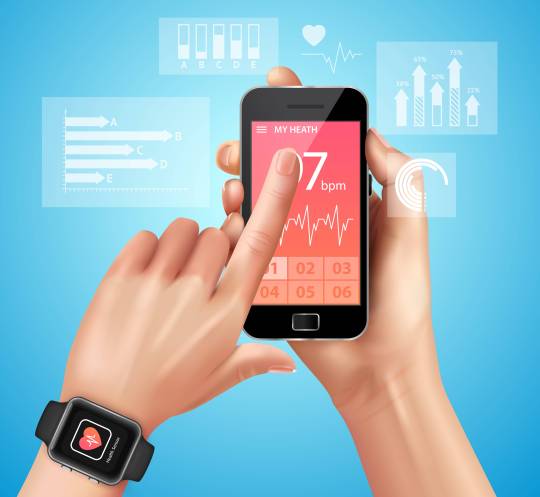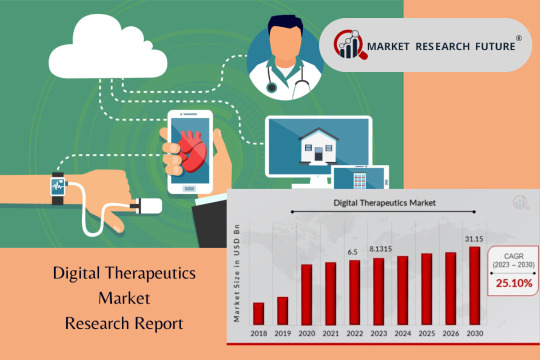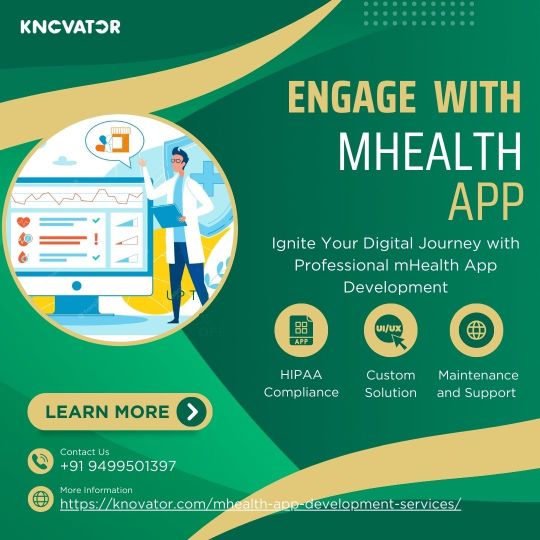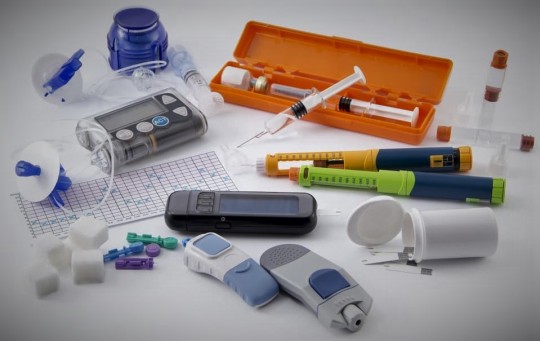#mHealth
Text
Smartwatch ECG Signals Transformed into Diagnostic Tools for Heart Failure using Artificial Intelligence

A new study published by researchers at the Mayo Clinic has shown that a smartwatch ECG can accurately detect heart failure in nonclinical environments. This is a significant breakthrough because it shows that heart failure can now be detected earlier and more effectively.
The research published in Nature Medicine reports a couple of health technology advances, which include an app and backend infrastructure that allow patients to share their ECG data from a smartwatch with their clinicians remotely in a secure and easy way, as well as a modified version of a proven 12-lead ECG artificial intelligence algorithm that can now be used to record ECGs on a single-lead watch.
It has been found in the study that consumer smartwatch ECGs can detect patients with cardiac dysfunction, a potentially life-threatening and often asymptomatic condition.
Continue Reading
#bioinformatics#artificial insemination#heart failure#ecg test#ehealth#health tech#mhealth#digital health#scicomm#medcomm#stem
47 notes
·
View notes
Text
that absolutely beautiful, relieving feeling when you realize that you’re a slow healer or a lifelong healer from trauma. it’s ok, there isn’t a timeline, you don’t have to keep track. you’ll notice the improvements in little bits and pieces.
8 notes
·
View notes
Text
MHealth Solutions Market Trends, Latest Techniques, Key Segments and Geography Forecasts Till 2031
Factors such as the rising adoption of Artificial Intelligence (AI) & 5G network, increasing adoption of mHealth solutions, and new mHealth platform launches are propelling the market growth. Moreover, growing applications of mHealth solutions across healthcare sector and growing demand for home healthcare services are some of the other factors playing a crucial role in driving the mHealth solutions market. However, lack of regulations and standards and concerns among patients regarding data security and data theft are some of the factors likely to hinder the market growth to a certain extent.
Widespread penetration of mobile communication is influencing health system development across many developed as well as developing countries. mHealth solutions have helped in making healthcare delivery more accessible and affordable. Advancements in these mobile apps hold promising applications in the healthcare sector. With the increasing use of mobile technologies, patients have gained much control on monitoring and adhering to their medications.

To access the Sample PDF of this research study, please request here: https://growthplusreports.com/inquiry/request-sample/mhealth-solutions-market/7667
Regionally, Asia-Pacific is anticipated to grow at a higher CAGR during the forecast period. Major factors contributing to the growth of mHealth solutions market in this region include rising geriatric population, rising incidence of chronic diseases, growing adoption of smartphones, increasing penetration of 3G and 4G networks, and rising awareness among consumers about the mHealth solutions.
Key players:
Ø Medtronic
Ø Koninklijke Philips N.V
Ø Apple Inc
Ø AirStrip
Ø Johnson & Johnson Services, Inc
Ø AliveCor, Inc
Ø Omron Healthcare, Inc
Ø athenahealth
Ø BioTelemetry, Inc
Ø iHealth Labs
Segmentation By Products & Services:
Ø mHealth Apps
Ø Connected Medical Devices
Ø mHealth Services
Browse the full report now: https://growthplusreports.com/report/mhealth-solutions-market/7667
Key Questions Answered in the Report Include:
(1) This report gives all the information about the industry analysis, revenue, and overview, of this market.
(2) What will be the rate of increase in market size and growth rate by the end of the forecast period?
(3) What are the major global Alzheimer’s Drugs Market trends influencing the development of the market?
(4) What are the vital results of SWOT analysis of the major players operating in the Alzheimer’s Drugs Market?
(5) What are the potential growth opportunities and threats faced by Major competitors in the market?
About Us:
Growth+Reports is part of GRG Health, a global healthcare knowledge service company. We are proud members of EPhMRA (European Pharmaceutical Marketing Research Association).
Growth+ portfolio of services draws on our core capabilities of secondary & primary research, market modelling & forecasting, benchmarking, analysis, and strategy formulation to help clients create scalable, ground-breaking solutions that prepare them for future growth and success.
We were awarded by the prestigious CEO Magazine as "Most Innovative Healthcare Market Research Company in 2020.
3 notes
·
View notes
Link
#iot#wearables#digital health#health tech#biotech#biotechnology#sensors#sensor#virus#flu#covid19#coronavirus#pathogens#mhealth#mobile health#face mask#pandemic#infectious diseases
1 note
·
View note
Text
mHealth services encompass a wide range of healthcare practices, delivered through mobile devices such as smartphones, tablets, and wearable devices. These services leverage the power of technology to provide convenient access to healthcare anytime, anywhere.
0 notes
Text
Global Digital Therapeutics Market: US, Germany, S. Korea & Japan Boom (2024)
Digital Therapeutics Market! Explore growth trends in the US, Germany, S. Korea & Japan. Discover how top companies like Proteus Digital Health & Wellthy are shaping DTx
The Rise of Digital Therapeutics: A Market Analysis by Country
The Digital Therapeutics (DTx) Market encompasses a rapidly expanding sector of healthcare that utilizes digital and interactive technologies to treat, manage, and prevent a wide range of medical conditions. These solutions leverage software applications, mobile apps, wearable devices, and sensor technology to deliver evidence-based…

View On WordPress
#ChronicDiseaseManagement#DigitalTherapeutics#DigitalTherapies#MentalHealth#mHealth#PatientEngagement#PersonalizedMedicine#PreventiveCare#RemotePatientMonitoring#Telehealth
0 notes
Text

We are now LIVE Streaming on YouTube every week and on TikTok . Check out the Latest LIVE Stream here:
👇👇👇 Episode 19 -
Slow Pack Order for Sue | Make Mango Martini Lotion | 2HR ChitChat 💖 #nbmusic 💖
https://www.youtube.com/watch?v=QPoy2...
Daily Self Motivation: A Word of Wisdom 💖 😄 💖
Commit to the Lord whatever you do, and he will establish your plans." - Proverbs 16:3
#romanticscents#soapmaking#fragrances#romantic scents#romantic#soap#bodycare#handmadesoap#fragrance#usa#bible quote#wisdom#understanding#reality#thought#mindfulness#forgiveness#mhealth#motivation#mindset#inspiring words#inspirational quotes#inspiration#life lessons
1 note
·
View note
Text
Key Components of Integrated Health Systems

Today's integrated healthcare solutions delivery systems have a variety of features and parts that improve patient outcomes. Various doctors and carers have different standards for the care of their patients. In order to deliver services effectively, integrated delivery systems must consult some of these key components.
Personalized patient care and patient portals:
Patient outcomes are the main focus of all practise management solutions, including integrated health care solutions. Integrated health systems must strive to offer personalised care in addition to comprehensive care. And patient portals make this feasible. In order to deliver adequate treatment, providers who are prepared to engage in integrated health systems must include personalised patient portals.
Case studies from several disciplines:
Another crucial element of an integrated medical solutions is interdisciplinary cases. In integrated care, additional consideration must be given to high-risk and acute care patients. Hence, interdisciplinary case references assist doctors in meeting the needs of acute care patients. In order to enhance value-based care and increase patient health, physicians can also make better treatment selections.
Consensus-building:
Primary care physicians, behavioural clinicians, and acute care providers are all part of an integrated health system. Moreover, collective and coordinated decision-making is necessary to improve the overall outcomes for patients. Therefore, the integrated health system needs to make sure that all parties are involved in making clinical decisions. Joint decision-making that improves patient outcomes is another factor that propels value-based care services.
Sharing information:
Clinical information must be shared quickly and securely across integrated health systems in order to improve value-driven treatment and patient outcomes. Medical informatics can be used by providers to manage complicated data for integrated care systems. Moreover, suppliers need to consider data storage, a potential issue with information sharing. Cloud computing in the healthcare industry aids in proper data sharing and storage.
0 notes
Text

Track 8: Digital Healthcare
Abstract submissions are pivotal in shaping the success and impact of conferences across various disciplines submit your abstract at the 14th World Healthcare, Hospital Management, Nursing, and Patient Safety Conference from July 25-27, 2024 in Holiday In Dubai, UAE & Virtual.
Submit here: https://nursing.universeconferences.com/digital-healthcare/
#DigitalHealth#HealthTech#Telemedicine#eHealth#HealthIT#mHealth#HealthcareAI#HealthData#Telehealth#DigitalMedicine#Nursing#NurseLife#NurseCommunity#NurseDHA#NurseEducation#NurseLeadership#MOH#Eid#Ramdan
0 notes
Text
The Gender Gap in Digital Health: Gender and Health Hub
With a focus on countries in the Global South, this infographic illustrates how the digital gender gap is exacerbating gender inequities in access to essential health services and best practices on how some countries are addressing it.
We must address the structural factors that cause it such as affordability, literacy digital skills and safety/security concerns; utilise design interventions that remove cultural and practical barriers and make technology useful for women; and involve women in the design, development, roll out and management of digital health products and services.
300 million fewer women than men use mobile Internet, with the gender gap being widest in South Asia (51%), followed by sub-Saharan Africa (37%) although it has been closing in recent years.
0 notes
Text
Telehealth- A Digital Revolution in Healthcare
Increasingly integrating devices, improved internet connectivity, and technical innovations have favored the penetration of telehealth. Telemedicine has undergone a cusp of changes in the recent past owing to innovations in monitoring, remote communication, and control. Accessible wearables and portable technology have spurred the adoption of telemedicine by underserved people. Computer science and integration in mechatronic devices have tremendous potential to unlock future capacities in healthcare services.
Companies in telehealth are focused on the development of new algorithms and the use of artificial intelligence (AI). Simplified digitalization methods are seen to have a positive impact on the management of huge volumes of patient-centric data commonly termed big data. Telehealth has made this data accessible among patients, and healthcare practitioners and facilitates bidirectional information between the health service domain and citizens.
The recent pandemic of Covid-19 has fostered the demand for telehealth services as there was the need for social distancing. By opting for telemedicine, companies could optimize their patient care services. Over time digital health became part of a common dialogue among patients and health systems.
COVID-19 has given a real ground for telehealth services. Mobile health apps and remote patient monitoring have seen optimistic growth in recent years owing to convenience and accessibility. However, companies operating in telehealth should pay attention to strategic aspects such as privacy, reliability, and control of their applications. Informed consent is necessary to make use of big data opportunities in the coming years.
0 notes
Text
I’m probably going to delete this later, but with all the news going on in the world right now, I just feel myself spiraling. I’m finding myself become more and more terrified and fearful and therefore just staying put, it that makes any sense.
The doom scrolling I’ve been doing recently has been way too much, and I know it’s in my own power to stop it, but my god the anxiety I get regardless…I just needed to vent.
3 notes
·
View notes
Link
1 note
·
View note
Text
Security Challenges in mHealth App Development: Safeguarding Patient Data

In our digitally driven age, the healthcare industry is undergoing a profound transformation, and mHealth apps are at the forefront of this revolution. Mobile health applications have the potential to empower both patients and healthcare providers, offering convenience, accessibility, and real-time health monitoring. However, this digital evolution brings with it a pressing concern: the security and privacy of patient data.
In this blog, we will delve into the critical issue of data security and privacy in mHealth apps. We’ll explore the unique challenges faced by developers in this domain and discuss best practices and technologies to ensure that patient data remains secure.
The Sensitivity of Health Data
Healthcare data is among the most sensitive and personal information individuals entrust to digital platforms. It includes not only medical histories and diagnoses but also details about lifestyles, genetics, and mental health. Consequently, protecting this data is paramount to maintaining patient trust and compliance with healthcare regulations.
Challenges in mHealth Data Security
1. Data Encryption:
One of the foundational aspects of mHealth app security is data encryption. Patient data should be encrypted both in transit and at rest. This means that when data is transmitted from the app to a server or vice versa, it should be encrypted to prevent interception by malicious actors. Likewise, data stored on devices or servers must be encrypted to thwart unauthorized access.
Best Practice: Implement strong encryption algorithms such as AES (Advanced Encryption Standard) and TLS (Transport Layer Security) for data transmission.
2. Access Control:
Controlling who has access to patient data is essential. Implement robust access control measures to ensure that only authorized individuals, such as healthcare providers and patients themselves, can access specific information. Two-factor authentication (2FA) can add an extra layer of security.
Best Practice: Implement role-based access control to limit access based on job roles and responsibilities.
3. Secure Development Practices:
Security should be baked into the development process from the beginning. Conduct regular security assessments and penetration testing to identify vulnerabilities in the app. Developers should follow secure coding practices and be aware of common security pitfalls.
Best Practice: Conduct regular code reviews with a focus on security.
4. Data Storage Compliance:
Healthcare data is subject to various regulations, such as the Health Insurance Portability and Accountability Act (HIPAA) in the United States. Developers must ensure that their mHealth apps comply with these regulations, which often require specific security measures and data protection practices.
Best Practice: Understand the applicable regulatory framework and implement necessary compliance measures.
5. User Education:
Patients and healthcare providers using mHealth apps should be educated about best practices for data security. This includes setting strong passwords, avoiding public Wi-Fi for sensitive transactions, and recognizing phishing attempts.
Best Practice: Provide clear, user-friendly guidance on data security within the app.
Technologies to Enhance mHealth App Security
1. Blockchain Technology:
Blockchain offers a secure and tamper-proof way to store and manage healthcare records. It ensures data integrity and enhances transparency in data access.
2. Biometric Authentication:
Leveraging biometrics like fingerprint or facial recognition can provide an extra layer of security for accessing mHealth apps.
3. Machine Learning and AI:
These technologies can be used to detect anomalies in user behavior and flag potential security breaches or data misuse.
Conclusion
In the world of mHealth app development, where innovation meets healthcare, data security and privacy are non-negotiable. Developers must prioritize these concerns throughout the development lifecycle. While this blog has outlined some best practices and technologies, it’s crucial to stay updated on evolving threats and security solutions.
Ultimately, by embracing robust security measures and technologies, mHealth app developers can not only safeguard sensitive patient data but also contribute to the continued growth and acceptance of digital healthcare solutions. The future of healthcare is undoubtedly digital, but it must also be secure.
0 notes
Text
Digital Diabetes Management Market by Product Type (Continuous Blood Glucose Monitoring System), Type (Handheld Devices, Wearable Devices), End User (Hospitals, Home Settings) - Global Outlook & Forecast 2023-2031
According to the deep-dive market assessment study by Growth Plus Reports, the global digital diabetes management market is valued at US$ 12.8 billion in 2022 and is expected to register a revenue CAGR of 7.9% to reach US$ 25.37 billion by 2031
Digital Diabetes Management Market Fundamentals
Digital diabetes management refers to the use of digital technologies, such as mobile applications, wearable devices, and software platforms, to monitor, track, and manage diabetes. These digital tools aim to empower individuals with diabetes to better understand and control their condition, improve self-management, and enhance communication with healthcare providers. Digital diabetes management solutions offer a range of features and functionalities that assist individuals with diabetes in various aspects of their daily management routine.
Get Free Sample PDF including full TOC, Tables and Figures, and Available customizations: https://www.growthplusreports.com/inquiry/request-sample/digital-diabetes-management-market/9287
Digital Diabetes Management Market Dynamics
The rising prevalence of diabetes and technological advancements are largely responsible for the growth of the global digital diabetes management market. For instance, according to the International Diabetes Federation, approximately 536,600 adults are living with diabetes, which is expected to reach 783,700 in 2045. The surge in diabetes cases worldwide is being attributed to fast-evolving lifestyles, such as smoking and alcohol intake. Additionally, one of the main causes of diabetes is obesity. With the rising number of obese people and greater patient awareness, the digital diabetes management market shows tremendous potential. The market is anticipated to see a wide range of developments in the diabetes arena as digital technology is always improving, which has the potential to revolutionize the way one manages the condition. Due to the numerous advantages involved with using these pens, smart insulin pens are very popular. It assists in keeping track of the quantity of each insulin dose and transmits the insulin dose data utilizing the bluetooth devices that are connected. This is a significant advantage provided by cutting-edge digital diabetes control technologies. The makers of smart insulin pens are adding new capabilities to their devices to make them more user-friendly for people with diabetes. There has been a rise in demand for digital diabetes solutions among patients with type one diabetes or those who are insulin-dependent and require constant monitoring of blood glucose levels. The number of smartphone apps available for managing the disease has increased over the last few years, and over a hundred apps are available on web-based app stores that can help patients monitor their blood glucose levels.
Digital Diabetes Management Market Ecosystem
The global digital diabetes management market is analyzed from the following perspectives: product type, type, end user, and region.
Digital Diabetes Management Market by Product Type
Based on the product type, the global Digital Diabetes Management market is segmented into continuous blood glucose monitoring systems, smart insulin pens, smart insulin pumps, smart glucose meters, and apps.
The continuous blood glucose monitoring system segment held the largest revenue share. This is because of its sophisticated features, like compatibility with smart devices used as display devices. Additionally, it can be configured to notify patients in a specific way when specific glucose thresholds are met. The market has been divided into categories based on the product, including apps, continuous blood glucose monitoring systems, smart insulin pens, smart insulin pumps, and smart glucose meters.
The smart insulin pens segment is expected to expand at the fastest rate during the forecast period. The segment's rapid growth is mostly related to the rise of artificial intelligence and the rising number of product launches. The market is being driven by several players concentrating on developing smart insulin pens, boosting their presence, and increasing their product offerings. For instance, Novo Nordisk introduced intelligent insulin pens in the UK in March 2022. The first-ever monitoring and recording technology is now available to diabetic patients getting care through the NHS.
Digital Diabetes Management Market by Type
Based on the type, the global digital diabetes management market is segmented into handheld devices and wearable devices.
The wearable devices segment accounts for the largest revenue share, and the segment is expected to grow at the fastest revenue CAGR during the forecast period. Technology breakthroughs like the emergence of artificial intelligence, the introduction of novel technologies like closed-loop pump systems and smart insulin patches, and the expanding use of self-insulin delivery devices in diabetes treatment are largely responsible for the market's growth. With a sizable revenue share, the handheld devices segment has grown significantly over the past few years, largely due to new product introductions and technological developments. The portable diabetes devices may detect and record blood glucose levels, determine how much insulin has to be administered to the patient, collect patient data via a user interface, archive patient data, and carry out other tasks.
Digital Diabetes Management Market by End User
Based on the end user, the global digital diabetes management market is segmented into hospitals, home settings, and diagnostic centers.
The home settings segment accounts for the largest revenue share in the global digital diabetes management market. Modern digital gadgets are combined with user-friendly user interfaces in the devices currently on the market. Patients' growing awareness of managing diabetes is what is driving the demand for the use of these devices. Due to the devices' usefulness in enabling professionals to communicate critical data with the aid of digital platforms, this market is predicted to expand. Due to the prevalence of professionals in domestic settings worldwide, market dilution is projected in the future. Because of the favorable circumstances, digital diabetes management solutions were in great demand in the home settings segment during the pandemic.
Digital Diabetes Management Market by Region
Geographically, the global digital diabetes management market has been segmented into North America, Europe, Asia Pacific, Latin America, and the Middle East & Africa.
North America accounts for the highest revenue share in the global digital diabetes market. This is due to the accessibility of cutting-edge technology and the recent approval of a large number of digital blood glucose patient monitoring devices. For instance, Insulet Corporation announced in January 2022 that the Omnipod 5 Automated Insulin Delivery System, which connects to the Dexcom G6 Continuous Glucose Monitoring (CGM), has received FDA clearance. The Omnipod 5 mobile app simplifies uploading data and monitoring patients remotely thanks to its integrated Smart Bolus Calculator. Additionally, it is expected that the regional digital diabetes management market will expand due to the rising older population and the burden of diabetes brought on by changing lifestyles.
Europe’s digital diabetes management market accounts for the second position and is expected to grow at a significant revenue CAGR during the forecast period. The regional market is also anticipated to improve due to the presence of strong competitors in the European region, the release of new products, and good reimbursement policies.
Asia Pacific is projected to witness the fastest growth during the forecast period. This occurs due to new products being released, diabetes being more common, and growing government initiatives. For instance, the Australian Centre for Accelerating Diabetes Innovation (ACADI) at the University of Melbourne would receive USD 10 million over 4 years, according to a federal government announcement made in January 2022. The ACADI will be a new virtual research hub that will connect research facilities all over Australia and assist significant industry partners and organizations in developing novel treatments, technological advancements, and behavioral interventions to address diabetes-related issues in the country.
Digital Diabetes Management Market Competitive Landscape
The prominent players operating in the global digital diabetes management market are: -
F. Hoffmann-La Roche Ltd.
Medtronic Plc
Ascensia Diabetes Care
Abbott Laboratories
Dexcom, Inc.
Insulet Corporation
B Braun Melsungen AG
Sanofi S.A.
Tandem Diabetes Care, Inc
Digital Diabetes Management Market Strategic Developments
In May 2023, Medtronic plc announced its entry into a series of formal agreements to acquire the creator of the tubeless, wearable, and entirely disposable insulin patch maker EOPatch® device, created by EOFlow Co. Ltd.
In April 2023, Glooko, Inc. announced a new international partnership with Hedia to integrate its technology into Glooko's platforms for managing diabetes that patients and healthcare professionals utilize. The collaboration will provide an interoperable solution that will improve access for patients with Type 1 and Type 2 diabetes who need direction on how much bolus insulin to inject by fusing connected care, remote patient monitoring, and digital therapeutic technologies.
In May 2021, GlucoContro.online, a browser-based diabetes management and analytics platform that offers data-driven treatment for those who use one of the Contour blood glucose monitoring meters, was just launched, according to an announcement from Ascensia Diabetes Care.
Visit our report store at https://www.growthplusreports.com/report-store

#digital diabetes management#diabetes management#digitalhealth#diabetescare#diabetes#diabetes monitoring#mhealth#telehealth#telemedicine#patientengagement#diabetessolution#diabetes treatment#diabetes awareness#mobile health
0 notes